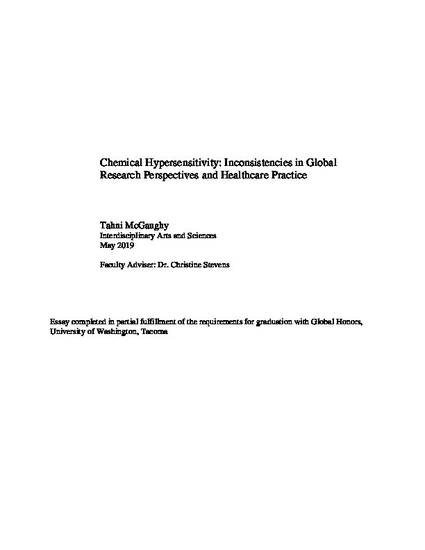
Thesis
Chemical Hypersensitivity: Inconsistencies in Global Research Perspectives and Healthcare Practice
(2019)
Abstract
All over the globe, an escalating number of people are developing distressing sensitivities to our environment’s everyday intoxicants. The experience of chemical hypersensitivity (CS) is embodied by proposed definitions of multiple chemical sensitivity (MCS) and idiopathic environmental intolerances (IEI), among other names. These acquired illnesses are characterized by a wide range of symptoms and reactions to low-level chemical exposures. Studies conducted in Japan, USA, Sweden, and Denmark found that 12% of the population has been diagnosed with chemical hypersensitivity, while total underreported prevalence is estimated between 15% and 27%. More importantly, research states that prevalence has increased by 300% within the past decade. People diagnosed with chemical hypersensitivity experience a range of symptoms, examples including asthma, heart irregularities, headaches, dizziness, confusion, skin irritation, and fatigue. Abundant in our everyday environment, commonly reported triggers include pesticides, building or renovation materials, car exhaust and chemical smog, smoke, perfumes and fragrances, and cleaning supplies, among others. With a myriad of proposed titles, contrasting research perspectives and approaches, and a staggering dissensus on physiology and diagnosis, it is critical that we compare and contrast the existing literature springing up globally. In this research, these problematic inconsistencies are represented by six themes: (1) prevalence and epidemiology, (2) associated symptoms, experiences, and epidemiology, (3) correlational information between CS and psychological health, (4) quality of life and coping, (5) societal and structural disadvantage, (6) and the current state of the healthcare system, such as contrasting treatment strategies and sensitivity accommodations. This paper aims to examine the global, contrasting research approaches, proposals for treatment or action, and subsequent healthcare experiences transcending geographical borders. Preliminary results suggest that inconsistencies in the medical diagnosis of CS lead to deficiencies in research and ineffective healthcare. By any given title, the escalating number of chemically hypersensitive patients is a growing global health concern. Integrating the globally contrasting approaches and diagnosis criterion is the first step to developing efficient healthcare strategies.
Keywords
- MCS,
- multiple chemical sensitivity,
- chemical sensitivity,
- environmental illness,
- global health,
- sick building syndrome
Disciplines
Publication Date
Spring May 30, 2019
Advisor
Christine Stevens, Ph.D.
Citation Information
Tahni McGaughy. "Chemical Hypersensitivity: Inconsistencies in Global Research Perspectives and Healthcare Practice" (2019) Available at: http://works.bepress.com/tahni-mcgaughy/1/
